-
1035
Java vs Dot Net: Which is Better for Future Development
Java and .NET both are best technologies in the tech arena for app and website development. They are used for creative, highly effective and secure software. But, there’s so many things which separate one from the other. The Java vs DOT NET helps you explore what.
Java and .NET are the two programming languages for creating Server-side and desktop applications. Both of the frameworks allow large-scale application development. But which one is better for your project? No idea? Explore this Java vs. .NET comparison, and you will be able to select the right one for your project. Let’s explore!
.NET vs Java in 2024 was the talk of the town and will remain in the limelight in coming years. Fundamentally, they are different, though they are often compared together for various reasons. Java is the excellent choice for mobile app development while .NET is the choice for web development.
As we have plenty of options for web and mobile app development, our clients often express their perplexities choosing .NET and Java. This is not the case with .NET or Java, there are plenty of other tech stacks such as React Native vs. Swift, React Native vs Flutter and more. We ensure to solve their issue through comparison. We have come up again this new one, “.NET vs. Java,” with the hope to help just like we did in all our articles written earlier.
Just because Java and .NET can be used interchangeably for the same goals, there’s always a dilemma when selecting one of the two. Although .NET and Java are referred to as a framework, truly speaking, only .NET should be considered a framework.
Java is best for mobile app development, while .NET is better for web application modernization, but Codzgarage is the right choice for both. We say this because we have expertise in both. Contact us today to let help you create a better future for your business.
In this article, we’re going to assess both technologies intensively based on different criteria to get a clear picture of .NET Vs. Java in 2024, their usage, and which one of them will be the first choice of developers in the year to come. But let’s start from the basics first and go gradually!
Java vs. ASP.NET: From Market Perspective
According to SimilarTech, there are around 1,494,718 ASP.NET websites active worldwide. However, if we talk about Java, it has less than 50% of active websites worldwide, with 58,046.
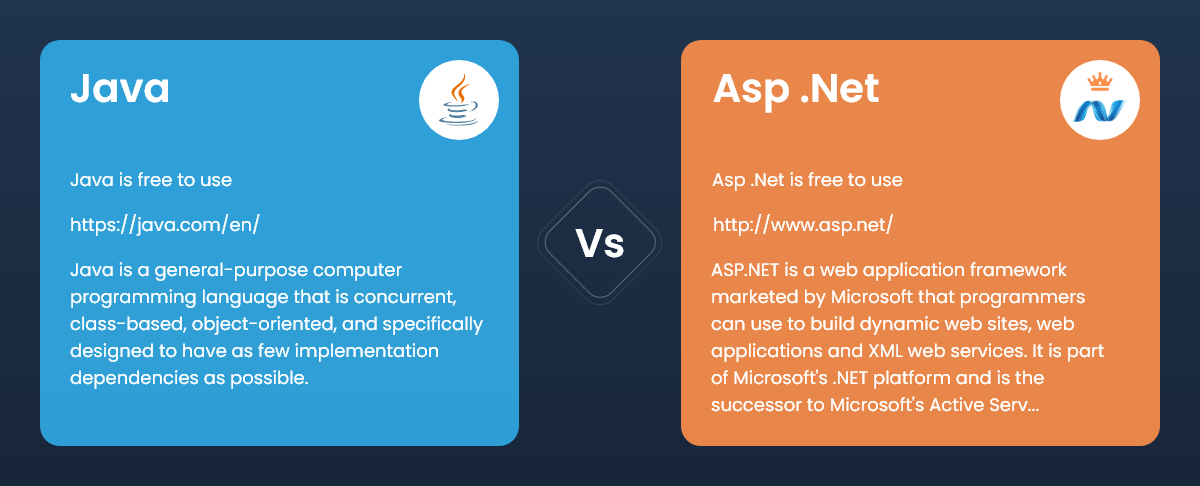
If we talk about other sources, around 7.3% of all websites use ASP.NET, while 4.6% use JAVA.
From the historical facts, ASP.NET is getting down as compared to JAVA, though the change is due to transformation within the tech stack. For example, developers now use .NET core and its latest version instead of traditional .NET. Whereas JAVA is showing steady growth.
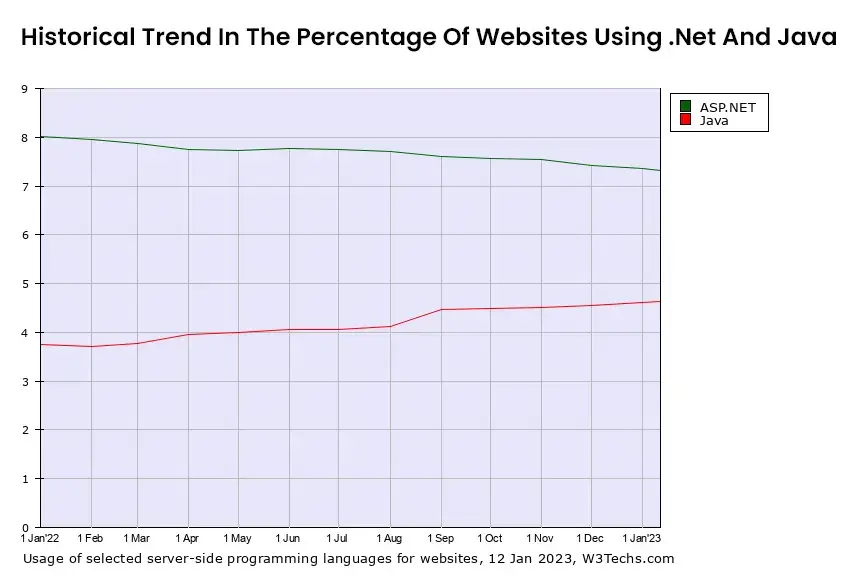
What’s Java?
Java is an object-oriented, cross-platform programming language developed by Sun Microsystem, dating back to 1995. It has evolved from its humble beginning and now powers a large share of the digital sphere. The programming language is considered to be the foundation for almost every type of networked application. Clean coding, high security, scalability, among many others are the reasons why Java is choice for mobile app development.
With the help of this programming language, we can build global standard mobile applications, embedded applications, games, enterprise applications, etc.
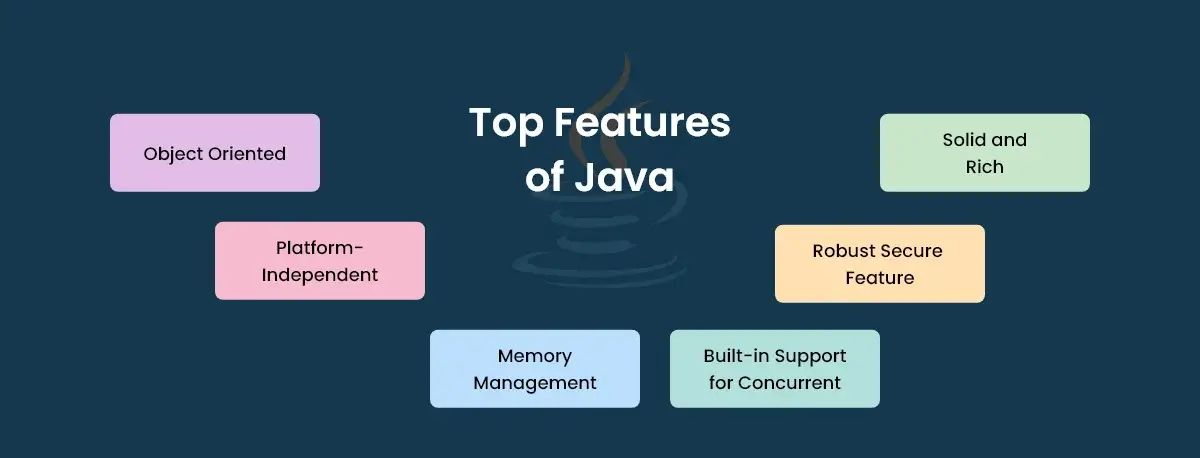
Developers use Java to create a variety of applications. The flexibility with programming language comes after a bunch of features. Some of the key features of Java include:
- Object-Oriented: Java is one of the top rated programming languages for mobile app development. It uses based on the concept of objects and classes. This allows developers to create modular programs and reuse code, making it easier to develop and maintain large software systems.
- Platform-Independent:Java is designed to be platform-independent, meaning it can run on any device with a Java Virtual Machine (JVM) installed. This makes it easy to write code that can be used on different operating systems, such as Windows, macOS, and Linux.
- Memory Management:Java includes automatic memory management, which means that the JVM automatically allocates and deallocates memory as needed. This makes it easier for developers to write programs without worrying about manually managing memory, which can be a source of bugs and security vulnerabilities.
- Built-in Support for Concurrent: Java includes built-in support for concurrent programming, which allows developers to write programs that can perform multiple tasks simultaneously. This can make Java programs more efficient and responsive, especially when running on multi-core processors.
- Robust Secure Feature: Java includes several security features, such as strict type checking and runtime checking, that help to prevent common vulnerabilities such as buffer overflows and cross-site scripting.
- Solid and Rich:Java includes many features that help to make it a rich programming language, such as exception handling and garbage collection. This can make it easier to write reliable programs that are less prone to errors.
Pros for Java
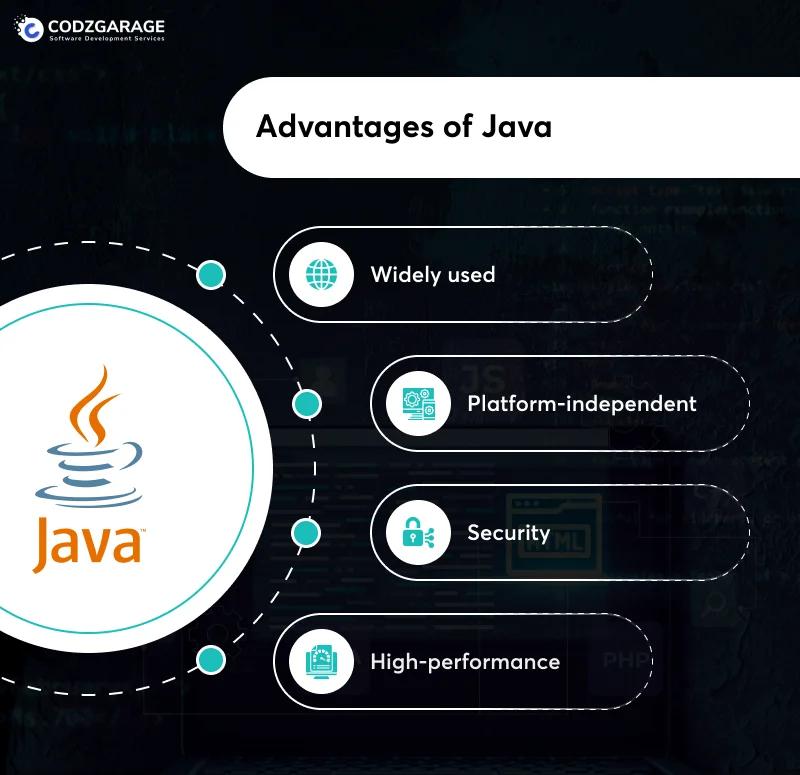
Java is the oldest programming language that offers unbeatable performance and scalability. Developers find it useful for various reasons. Here’s what;
- Widely used: Java is one of the most popular programming languages in the world, and millions of developers and billions of devices use it. This means that there is a large community of developers who can provide support and resources, and it is easy to find libraries and frameworks that can be used to build Java applications.
- Platform-independent: As mentioned previously, Java is designed to be platform-independent, which means that it can run on any device that has a Java Virtual Machine (JVM) installed. This makes it easy to develop applications that can be used on a variety of operating systems and devices.
- Security: Java includes a number of security features, such as strict type checking and runtime checking, which help to prevent common vulnerabilities such as buffer overflows and cross-site scripting.
- High-performance: Java programs are typically compiled to bytecode, which the JVM can execute. The JVM is highly optimized, which means that Java programs can often run faster than programs written in other languages that are interpreted at runtime.
Cons of Java
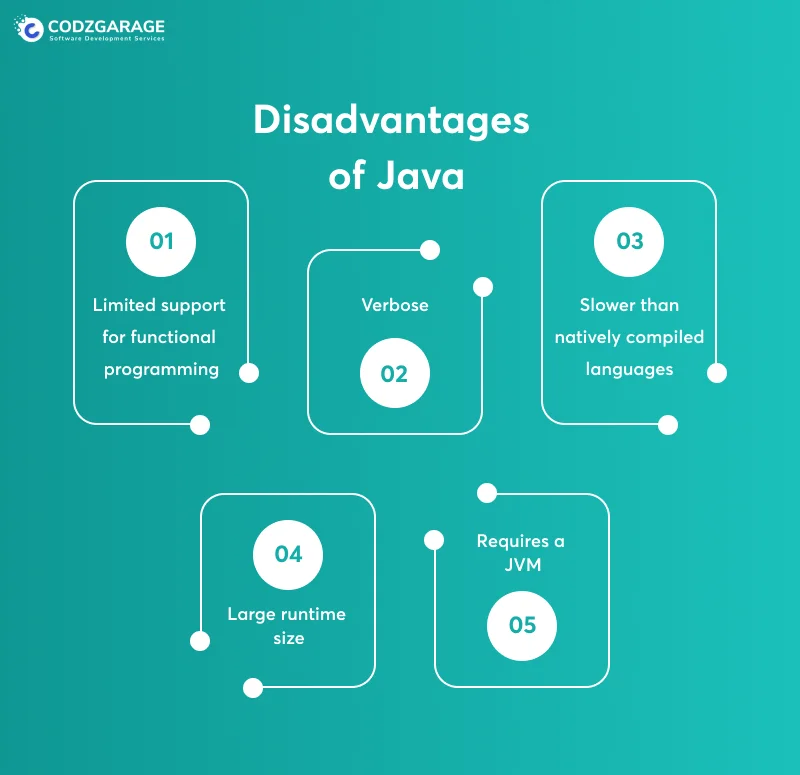
While Java has many benefits as a programming language, it also has some drawbacks:
- Slower than natively compiled languages: Java programs are typically slower than programs written in languages that are compiled directly to machine code, such as C++. This is because the Java bytecode must be interpreted by the JVM, which adds an extra layer of abstraction.
- Requires a JVM: In order to run Java programs, a device must have a Java Virtual Machine (JVM) installed. This can be a drawback if the device does not have a JVM installed or if the device does not have enough resources to run the JVM.
- Verbose: Java code can be verbose, meaning that it requires a lot of lines of code to accomplish simple tasks. This can make it more time-consuming to write and maintain Java programs, especially when compared to more concise languages.
- Limited support for functional programming: Java does not have native support for functional programming constructs such as lambda expressions and higher-order functions. While it is possible to use these constructs in Java, they must be implemented using workarounds, which can make the code more difficult to understand and maintain.
- Large runtime size: The JVM and the Java standard library have a large runtime size, which can make Java programs larger and more memory-intensive than programs written in other languages. This can be a drawback when deploying Java programs to devices with limited resources.
Why should I Choose Java?
Right from its inception in 1995, Java has been one of the high-rated programming languages for state-of-the-art software development. One of the reasons is that, unlike other programming languages, Java is easy to learn and has many similarities with C++, C, and JavaScript. Hence, anyone with experience and expertise in the above-mentioned languages can simply learn the Java syntax with no obstacles.
Besides, the programming language owns a rich set of APIs that’s of utmost benefit for developers while building robust error-free applications.
What’s .NET?
When it comes to robust and quality software, ASP.NET development is the crucial one. .NET is an open-source, cross-platform software development framework developed by Microsoft that’s used to build various types of software applications. It supports developing and running next-generation apps and web solutions. Using .NET, you can develop modules and reuse them, resulting in enhanced productivity and error-free codes.
With .NET, you can use multiple libraries, languages, and editors to build mobile apps, web apps, games, IoT, etc.
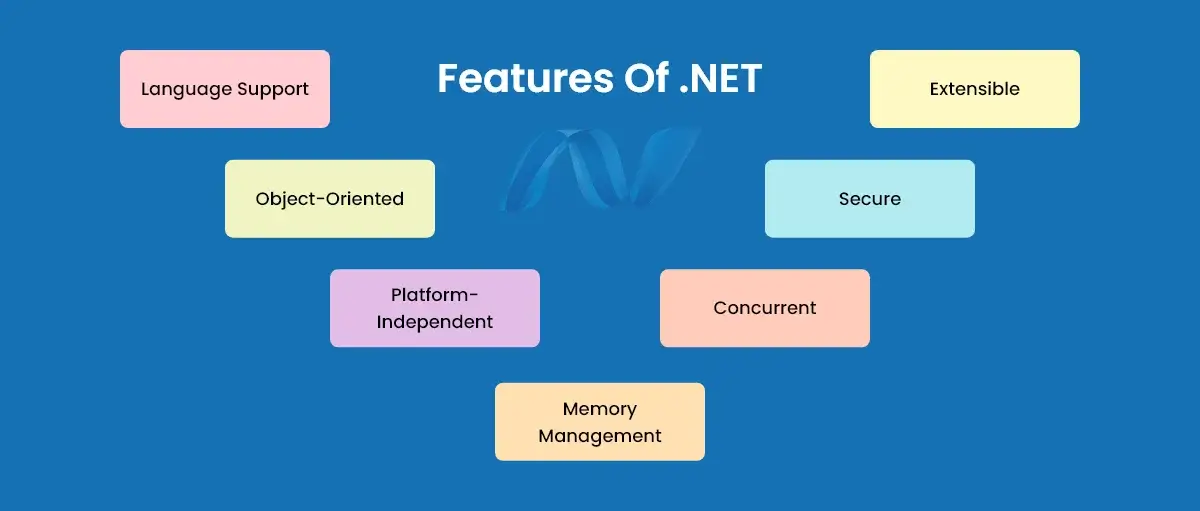
.NET is a software framework developed by Microsoft that runs primarily on Microsoft Windows. It is used for building a variety of applications, including web, mobile, desktop, and cloud applications. Some of the key features of .NET include:
- Language support: NET supports a variety of programming languages, including C#, F#, and VB.NET. This allows developers to choose the language that best fits their needs and skillset.
- Object-oriented: .NET is an object-oriented framework, which means that it is based on the concept of objects and classes. This allows developers to create modular, reusable code and to structure their programs in a logical and organized way.
- Platform-independent: While .NET was originally developed for the Windows operating system, more recent versions of the framework have been designed to be platform-independent. This means that .NET applications can run on a variety of operating systems, including Windows, macOS, and Linux.
- Memory management: .NET includes a garbage collector that automatically manages memory, freeing developers from the need to manually allocate and deallocate memory. This can help to prevent common memory-related bugs and security vulnerabilities.
- Concurrent: .NET includes built-in support for concurrent programming, which allows developers to write programs that can perform multiple tasks simultaneously. This can make .NET applications more efficient and responsive, especially when running on multi-core processors.
- Secure: .NET includes a number of security features, such as code access security and role-based security, that help to protect applications from common vulnerabilities such as injection attacks and cross-site scripting.
- Extensible: .NET is designed to be extensible, which means that developers can create custom extensions and libraries that other .NET applications can use. This can make it easier to reuse code and build upon the capabilities of the .NET framework.
Pros of .NET
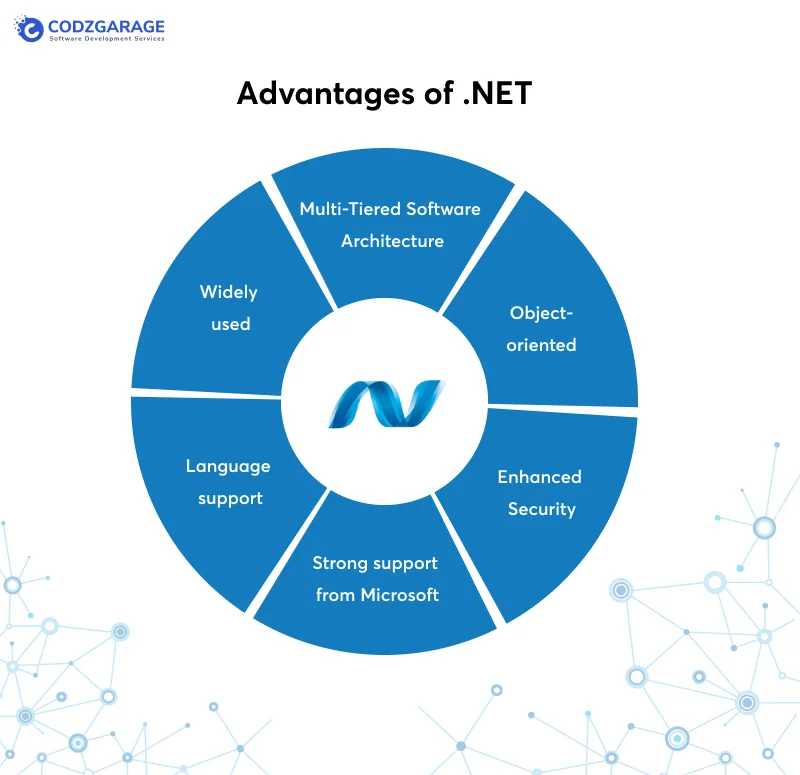
There are several benefits to using .NET as a software framework, including:
- Widely used: .NET is a popular framework that is used by millions of developers and organizations around the world. This means that there is a large community of developers who can provide support and resources, and it is easy to find libraries and frameworks that can be used to build .NET applications.
- Language support: .NET supports a variety of programming languages, which allows developers to choose the language that best fits their needs and skillset. This can make it easier for developers to learn .NET and to build applications that meet their specific requirements.
- Object-oriented: .NET is an object-oriented framework, which means that it is based on the concept of objects and classes. This makes it easy to organize and structure code, and to reuse code in different parts of a program.
- Enhanced Security: .NET includes a number of security features, such as code access security and role-based security, which help to protect applications from common vulnerabilities such as injection attacks and cross-site scripting.
- Strong support from Microsoft: .NET is developed and supported by Microsoft, which means that there are many resources and tools available for .NET developers. This can make it easier for developers to get started with .NET and to build high-quality applications.
- Multi-Tiered Software Architecture: .NET is a software framework that is based on a multi-tiered architecture, such as Presentation tier, Business logic tier and Data tier. This means that the framework is divided into distinct layers, or tiers, each of which performs a specific function.
Cons of .NET
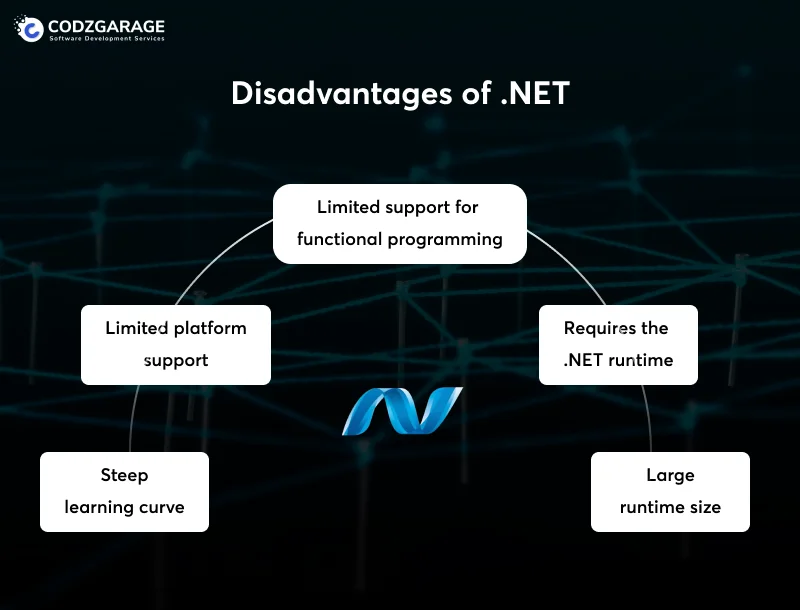
While .NET has many benefits as a software framework, it also has some drawbacks:
- Limited platform support: While more recent versions of .NET are platform-independent, older versions of the framework only supported the Windows operating system. This can be a drawback for developers who need to build applications that run on other platforms.
- Requires the .NET runtime: In order to run .NET applications, a device must have the .NET runtime installed. This can be a drawback if the device does not have the runtime installed, or if the device does not have enough resources to run the runtime.
- Steep learning curve: .NET is a large and complex framework, which can make it difficult for new developers to learn and master. It can also be difficult for developers who are familiar with other frameworks or languages to learn .NET, since it has a unique set of concepts and conventions.
- Limited support for functional programming: .NET does not have native support for functional programming constructs such as lambda expressions and higher-order functions. While it is possible to use these constructs in .NET, they must be implemented using workarounds, which can make the code more difficult to understand and maintain.
- Large runtime size: The .NET runtime and the .NET standard library have a large size, which can make .NET applications larger and more memory-intensive than applications written in other languages. This can be a drawback when deploying .NET applications to devices with limited resources.
Why Should I Choose .NET?
When it comes to this question of why you should choose to use .NET for your next project, there are multiple reasons. .NET Core development is an advanced version of .NET Framework and capable of creating high quality web, mobile, desktop applications. One of the pluses of this language is it’s open-source, and anyone can utilize it without restrictions cost-effectively. The next one is it’s an object-oriented programming language allowing developers to conduct their tasks with ease and convenience in a more consistent manner.
Besides, the programming language is extremely versatile, meaning F#, C#, and even Visual Basic Programmers can simply learn and use .NET with optimal comfort. These are some of the reasons that make .NET a well-known programming language for software development.
End-To-End Comparison Between Java Vs. .NET
We’ve looked into the fundamentals of Java & .NET, for instance, what’s .NET & Java, their pros and cons, and most importantly, why to use them. Now, it’s high time we gauged Java Vs. .NET’s differences and similarities and some more key differentiators to know which one will be the right choice for your project in 2023. Let’s do it!
Fundamentals
Java is a high-end object-oriented programming language and computing platform that was introduced in 1995. The language is designed to have as few implementation dependencies as possible. It’s widely utilized across many devices, and that’s what makes it one of the best object-oriented programming languages.
On the other hand, .NET is an open-source framework that’s used to create various types of applications. The framework was introduced in the year 2000, and since then, it has acquired its own place and is being used by developers around the world.
Features
Both of the technologies are high-rated choices for enterprise software development. Here are the key areas to compare .NET & Java in terms of features. Let’s have a look at the table below!
| NO. | Factor | Java | .NET |
|---|---|---|---|
| 1. | Programming Language | Kotlin, Java, Python, JavaScript, PHP, Scala, Groovy, Ruby, and so on | VB.NET, C++, C#, .NET, Ruby, Python, and so on |
| 2. | Supported IDE | Eclipse, Oracle, NetBeans, JDeveloper, IntelliJ Idea | MonoDevelop, Microsoft, Visual Studio, Rider |
| 3. | Web Service Support | Add-on | Built-in |
| 4. | Web Server Scripting | JSF | ASP.NET |
| 5. | Runtime | JVM | CLR |
Performance
When the question arises regarding the performance of .NET Vs. Java, they have some differences and similarities; let’s look at Java first! Java’s syntax is derived from C++ and C; thus, you can find plenty of similarities between .NET & Java. However, its platform-independent technology allows you to use its code whenever you want. Unlike Java, .NET provides a general purpose and simple programming language that supports array bounds, collecting garbage, types checking, and so on.
This offers the users more robustness and durability as well as efficiency. Another one is that the Java arrays possess features to highlight checked and unchecked expectations. Leaving these points, the performance of .NET and Java is almost equal.
Security
When comparing these two technologies in terms of security, both are almost identical and provide optimal security assurance. Java and .NET both support code signing while enforcing an execution sandbox. As Java is a cross-platform technology, it’s more likely to be vulnerable to security breaches. Contrary to this, .NET offers more security compared to Java.
Learning Curve
However, learning Java can be a bit overwhelming because of its length of documentation, while learning .NET is way more convenient. Apart from this factor, both of the technologies have easy learning curves. Hence, anyone can learn these with a little effort.
Coding Speed,
However, Java has different threads to ease the handling and processing sequence of instructions; .NET wins the race in terms of coding speed. Being object-oriented technology with reusable components, yielding the same software using .NET consumes less time compared to doing the same job with Java. Hence, when it comes to coding speed, .NET is ahead of the curve leaving Java behind.
Scalability
Like security, both Java and .NET are almost identical when it comes to scalability, and both of the technologies are among the most stable ones. Because of this next level of scalability, Java and .NET are employed for building simple and complex enterprise-level applications.
Time To Market
The size of your project can immensely influence your project’s time to market. Some elements can streamline the time to market of your project, for instance, well-documented technologies, readily accessible libraries, third-party libraries, as well as an efficacious pool of developers. Whatever keeps you from writing codes from the beginning and developing the project from scratch can be helpful in order to speed up the product’s time to market.
Both Java and .NET virtually match the essential code integration and reusability resulting in a streamlined time to market of the project.
Operating System
One of the crucial differences between Java and .NET is that Java, with its JRE and compiler, can operate on different operating systems, as it’s based on the principle “right once, and execute anywhere.” On the other hand, .NET is limited to Windows and its multitude of versions. However, there are a few open-source versions of .NET, and they all serve the purposes of Windows users. Thanks to the JVM, Java’s code can run on any platform.
Since Java is platform-agnostic, it has a significant edge over .NET.
Integrated Development Environment (IDE)
Another significant facet to compare between .NET and Java is Integrated Development Environment (IDE). It’s a kind of software that provides you with all the necessary tools to develop and test software applications. There are four primary IDEs provided by Java, like Oracle NetBeans, Oracle JDeveloper, IntelliJ Idea, and Eclipse. While Microsoft Visual Studio is the default IDE for .NET.
Assistance For Language
Java makes use of a single language for all its platform. The software runs on a multitude of operating systems, and it supports Ruby, Groovy, Kotlin, Python, and so on. On the other hand, .NET supports backend languages, including C++ and C#. It supports more than 20 languages enabling you to program in any programming language you prefer, for instance, C#, .NET, VB.NET, and several others.
.NET provides a multi-programming environment but supports a single platform.
On the other hand, Java supports various environments while being based on a single programming language.
Popularity
Java is more in demand when compared to .NET in terms of popularity. Research states that organizations actively hire Java developers for both their legacy as well as new software requirements. On the other hand, .NET developers are needed as well, but the number of job posting for them is a bit lower.
Developers are more likely to select and utilize technologies that are needed and in demand; hence, it proves that Java is more in demand than .NET. A survey by Stack Overflow reveals that there are around 35.1% of professionals use .NET, whereas around 38.4% choose to use Java.
Community
In terms of community, Java leaves .NET behind. Being platform-independent technology and existing for such a long time has immensely vouchsafed Java with a wider community of developers. There are a wide array of developers who created Mobile, Web, and Desktop apps using Java that successfully run on various platforms.
A big community indeed matters the most— as they uninterruptedly offer assistance and share their experience with a specific framework or programming language, and in this, Java is ahead of the curve.
Development Cost
As per Glassdoor, the average salary of a .NET developer is $76.5K, while the average salary of a Java developer is $79K. The difference here shows that Java is an expensive solution, but wait, there’s something more to examine before the verdict. When you use Java, you can develop software solutions for different platforms, whereas, with NET, you can’t do this; hence, from this perspective, Java, compared to .NET, seems to be more cost-effective.
Point To Point Comparision: Java vs .NET
| Factor | Java | .NET | Developer | Sun Microsystem | Microsoft |
|---|---|---|
| Definition | Java is an object-oriented platform-agnostic programming language that performs on any programming language. The language offer (Java Virtual Machine) JVM makes it a portable language. | .NET is an open-source, cross-platform framework used to develop various types of software apps. The framework works on Windows, macOS, and Linux. |
| File Extension | Java | .NET |
| Architecture | It supports connected architecture | It supports disconnected architecture |
| Garbage Collection | Less efficient garbage collection compared to .NET | More efficient Garbage Collection Compared To Java |
| Exception Handling | Hard Exception Handling | Easy Exception Handling |
| Community Support | 11.6K start and 2.9K stars and forks on GitHub, respectively | 12.6K stars and 2K start and forks on GitHub, respectively |
| Web Application Framework | Spring Boot, Spring | MVC, ASP.NET, Spring .NET |
| LINQ Availability | Doesn’t support LINQ | Supports LINQ |
| Messaging Queue | JMS (MQ series, etc.), AMQP | MSMQ |
| Language | Java is itself a language, hence doesn’t support any other language | .NET supports around 20 languages, for example, VB.NET, C#, C++, PHP, .NET, Ruby, and so on. |
| Platforms | JavaSE, JavaEE | ASP.NET, .NET, .NET, ASP.NET core, Silverlight. |
| Data Access | JDBC | OleDB/ADO.NET |
| XML | Saxon, Jackson, Xerces, etc. | System XML |
| Talent Pool | There are 35.6% of professionals work using Java | There are 34.4% of professionals work with Java |
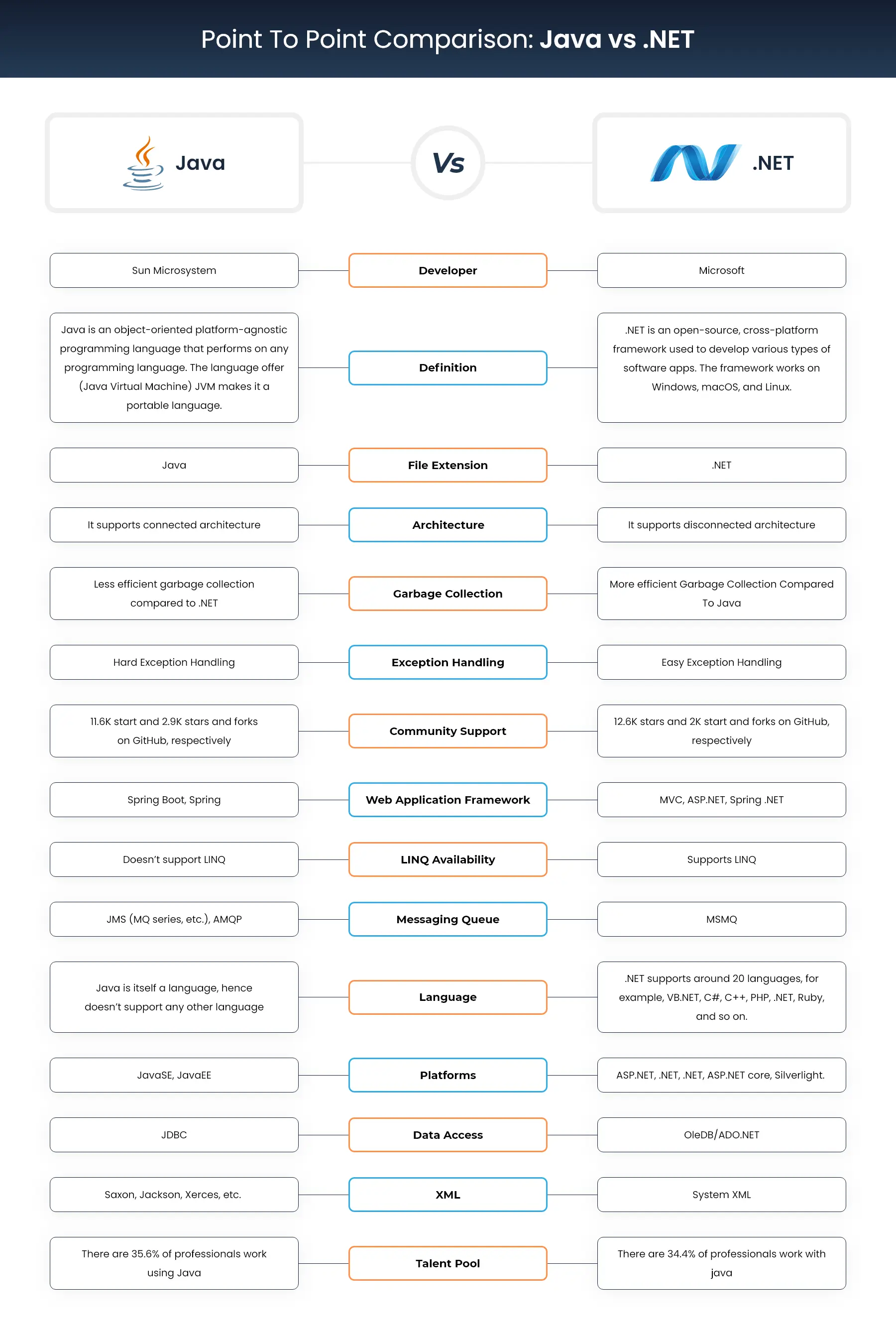
Where To Use Java?
You can use Java for for building various types applications. Have a look at the information below to get an overview of where to utilize Java.
- Enterprise Application Development (for modern as well as legacy applications)
- Android App Development
- Web Applications (LIke, Gmail and Google Docs)
- Embedded Systems
- Software (Jira/Eclipse)
Where To Use .NET?
Like Java, there are numerous uses for .NET as well. Here are some of the projects for which you can make use of .NET!
- Clients Applications
- Gaming Applications
- Enterprise Application Development
- Web Applications and Websites
Which One Of These Two Is A Perfect Choice?
Java and .NET both provide almost the same functionality targeting the same marketplace. When it comes to choosing between these two, the choice depends on infrastructure, interoperability, end-uses, development skills, and other project requirements of the project you’re working on. Developers prefer .NET when they need rapid application development and Java for a large project.
You won’t go wrong if you choose one of the two–as both are high-performance technologies. To choose the best one, consider an intense assessment of your needs, objectives, and requirements, and then select one that fits your needs.
Wrapping Up!
After comparing .NET vs. Java based on different criteria, now is the time to come to a conclusion. Java and .NET are prominent software development technologies with advantages and disadvantages. When you need flexibility, Java will excel, and you can prefer .NET when you have a project with complex infrastructure. We hope you benefit from this article; if you need more information, we are happy to help.
So, if you are sure to choose the right tech stacks for your project, hire mobile app developers with proficiency in Java or hire .NET Core developers with expertise in building high quality applications for you.
Codzgarage is one of the top-rated custom software development companies with a wide range of service offerings for web and mobile. Contact us today to know more about us and how we can help you shape your ideas into a successful application.
Want Explore
.NET PossibilitiesWe Can Help
- Migrate to .NET
- Hire .NET developers
- Build .NET Apps




 Paresh Kapuriya
Paresh Kapuriya 







